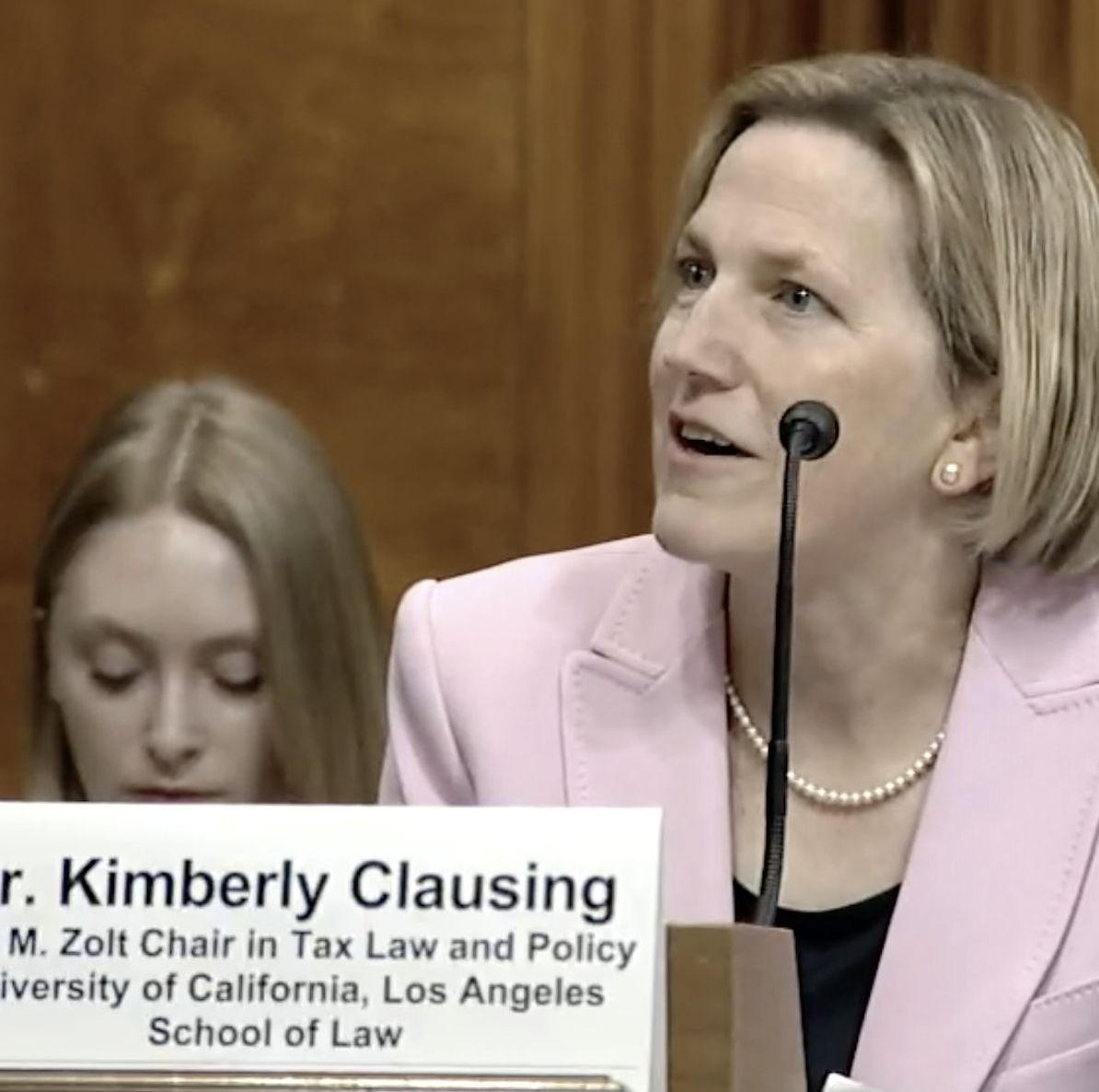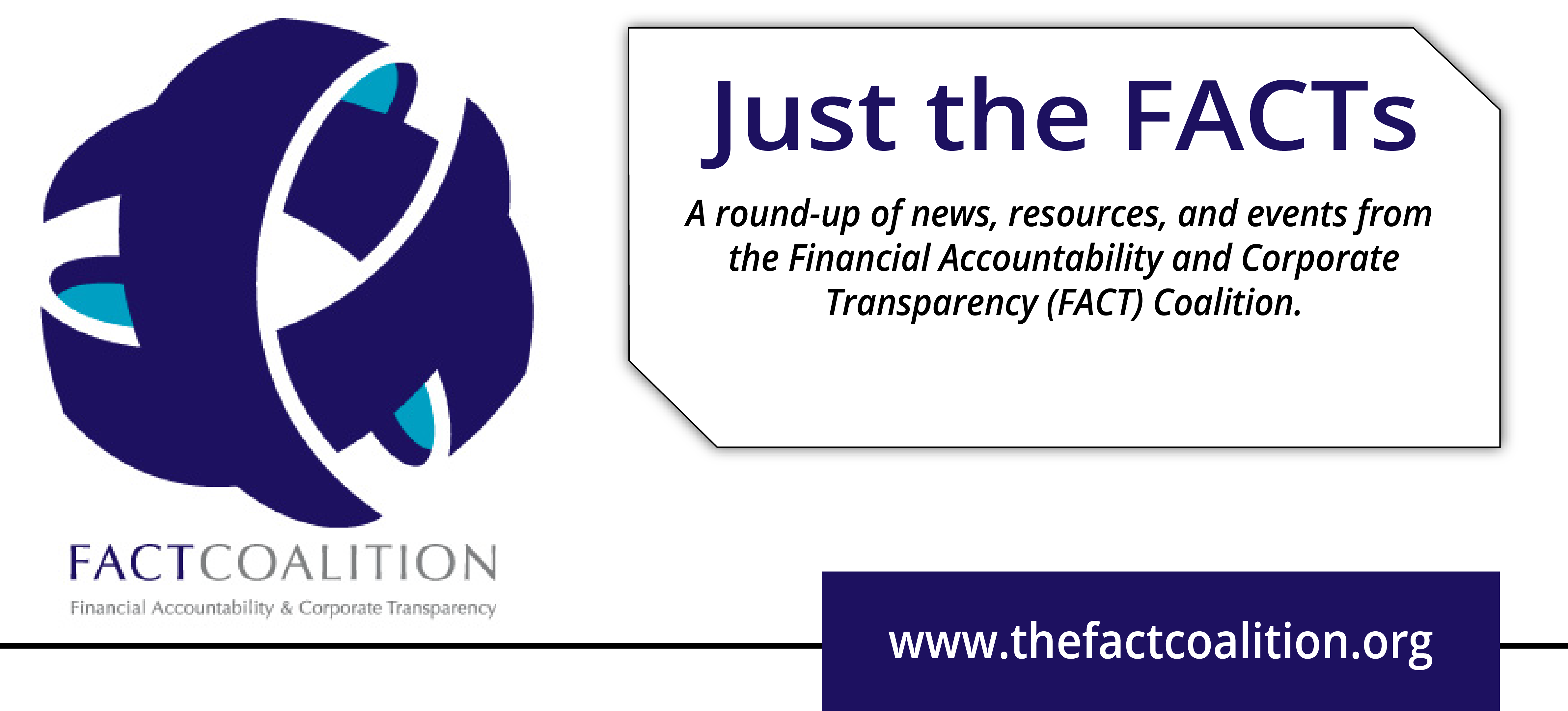“Just the FACTs” is a round-up of news stories and information regarding efforts to combat corrupt financial practices, including offshore tax haven abuses, corporate secrecy, and money laundering through the financial system.
Send feedback or items for future newsletters to Thomas Georges at tgeorges@thefactcoalition.org
Here is the State of Play
Senate Hearing Outlines Need for Public Country-by-Country Reporting, Among other Tax Reforms

Former top Treasury official Dr. Kimberly Clausing spoke in favor of public country-by-country reporting (CbCR) requirements for large U.S.-listed multinationals before the Senate Budget Committee on Wednesday, saying that such reporting “is very important” and “might lead to useful changes” in the tax strategies of the largest U.S. firms.
Clausing’s remarks, which were made during a Senate Budget Committee hearing on multinational tax avoidance, reflect growing momentum for greater tax transparency across the globe. Shareholders have been increasingly demanding transparency from major U.S.-based multinationals, while jurisdictions including the EU and Australia have advanced forms of public CbCR to better hold large companies accountable for their tax practices.
During the hearing, Senator Van Hollen (D-MD) specifically noted recent moves by the Financial Accounting Standards Board (FASB) to require greater disclosure of public companies’ taxes paid and foreign tax effects, and flagged his own bill, the FACT-endorsed Disclosure of Tax Havens and Offshoring Act (S. 638), which would require the SEC to issue a rulemaking instituting public CbCR for major multinationals.
When questioned about the benefits of expanded tax disclosures, Clausing was unambiguous:
“(Public CbCR) really forces companies to be transparent. If they’re going to earn most of their income in an offshore location where they have almost no employment, then they should be willing to say that out loud to their investors, to their workers, to their consumers, and to the American public, because what they’re doing is effectively putting those tax burdens on others.”
The hearing also drew attention to broad patterns of tax avoidance incentivised by the U.S. tax code, including the steep discount multinationals receive on their foreign operations under the Global Intangible Low-Taxed Income (GILTI) rules enacted as part of the 2017 Tax Cuts and Jobs Act (TCJA). Under GILTI, large U.S.-based multinationals are currently taxed at only 10.5 percent on profits derived from foreign operations, half of the topline corporate statutory rate of 21 percent.
During the hearing, Senate Budget Committee Chairman Sheldon Whitehouse (D-RI) highlighted his No Tax Breaks for Outsourcing Act (S. 357), which would address this imbalance by applying the 21 percent statutory rate to all income derived by major multinational corporations, regardless of the country that income is booked in. This legislation has been endorsed by 61 labor, tax fairness, environmental justice, and small business organizations, including FACT.
Another witness, Roy Houseman of the United Steelworkers (USW), noted the severe disadvantage that the current tax code imposes upon domestic businesses that are too small to establish overseas operations for tax purposes. “If you ask (ordinary businesses) if it makes any sense that American corporations as a group reported to the IRS that they earned 60 billion in the Cayman Islands in 2019, when the entire economic output of that tiny nation was just 6 billion that year,” he said, “I am confident they would call this a tax loophole. It’s time to end this doublespeak math and start treating tax havens for what they are.”
The Cayman Islands are not alone in this regard. A new report by FACT Steering Committee member ITEP identifies 15 jurisdictions that – though together accounting for just three percent of global economic output outside the U.S. – host 59 percent of the offshore profits of U.S. multinationals.
Click here to read FACT’s statement for the record submitted ahead of yesterday’s hearing. FACT shared highlights during the hearing here.
Happening Now: @SenateBudget hearing on multinational tax avoidance, featuring experts from academia and the small business community.
— FACT Coalition (@FACTCoalition) January 17, 2024
Closing tax loopholes and ensuring tax transparency for MNEs are key first steps toward reform.
Watch live here: https://t.co/xIDQNrDa6p https://t.co/48dEsoeNgt

Treasury Advances Rule Cracking Down on Money laundering in U.S. Private Investment Markets
The Financial Crimes Enforcement Network (FinCEN), the bureau of the Treasury Department tasked with implementing a number of critical anti-money laundering reforms, sent a draft rule establishing anti-money laundering safeguards for the U.S. private investment sector to the Office of Information and Regulatory Affairs (OIRA) on January 10, advancing a long-held FACT priority. Per the OIRA dashboard, the draft rule is expected to be released for public comment in February.
The $11 trillion private investment market has long been a blindspot for regulators trying to clamp down on illicit financial flows into the U.S. The nation’s more than 13,000 professional investment advisors have few, if any, meaningful anti-money laundering responsibilities, and large private funds do not fall under the same reporting requirements as public equity and retail funds.
An initial draft rule addressing this blind spot was proposed in 2015, which would have required certain registered investment advisers to establish AML programs and submit Suspicious Activity Reports (SARs) to law enforcement. Though that rule was never finalized, the Biden Administration committed to reviewing and reissuing the rule in its 2021 Strategy on Countering Corruption, as well as to considering an expanded scope of covered funds.
FACT in the News

FACT Dispels Corporate Transparency Act Implementation Myths
FACT government affairs director Erica Hanichak was quoted in coverage by ICIJ’s Spencer Woodman of the rollout of Treasury’s groundbreaking beneficial ownership registry, in which she dispelled myths surrounding the measure’s requirements and possible penalties for small businesses.
“Firms are not eligible for criminal penalties if they’re unaware of the law,” Hanichak said. “The threshold is really high for a business to fall under any consequences under this law.” Filing, meanwhile, is simple for most small businesses, and only needs to be done once while a given owner remains in control. “Take a small pizza shop. As long as they don’t switch ownership, they won’t have to file again for 30 years, or maybe never.”
Recent and Upcoming Event

Watch: Senate Budget Committee Hearing: The Great Tax Escape – Closing Corporate Loopholes that Reward Offshoring Jobs and Profits
Watch a full recording of yesterday’s Senate Budget Committee hearing on multinational offshore tax avoidance, featuring remarks from former Treasury official Kimberly Clausing, USW’s Roy Houseman, and Small Business Majority’s John Arensmeyer.
In her remarks, Clausing noted that public CbCR’s potential effects on the profit-shifting tactics of major multinationals could be described as “a market-friendly nudge.”
“It’s just saying, ‘Tell us what you’re doing,’” she added. “‘We’re not going to regulate per se, we’re just going to ask you to share your information with the public.’ And I think that sunshine might lead to useful changes in their behavior as well.”
About the FACT Coalition

